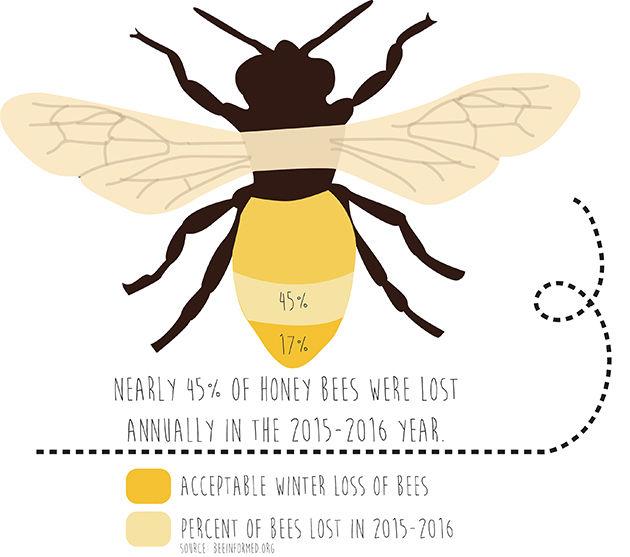The rusty patched bumble bee was recently added to the list of endangered species — making it the first endangered bee species in the continental United States — and A&M researchers are devising a way to help preserve the remaining bee population.
Juliana Rangel is the head of the A&M Honey Bee Lab, which consists of Rangel and four graduate students who work with local bee species on projects like determining toxicology and pathology of the Texas honey bee populations, and developing a breeding program to create better adapted queen bees. Placed under the protection of the Endangered Species Act on March 21, the rusty patched bumble bee joins seven endangered bee species from Hawaii and 700 total species close to extinction in North America.
Rangel said the addition to the endangered species list could potentially have positive consequences for bee habitats.
“Hopefully this means there will be an improvement in provided habitats and an increase in the funding for native pollinators,” Rangel said.
Rangel believes the misfortune of the rusty patched bee will encourage the public to become more active in bee conservation, especially locally.
“There are many ways to get involved,” Rangel said. “The Texas Beekeepers Association provides courses and workshops, and once a year there is a school in Brenham of the Central Texas Beekeepers Association that is available for beginners and intermediates.”
One of the A&M Honey Bee Lab projects is the creation of Aggie Honey, which is produced at the John G. Thomas Bee Facility Research Apiary on the RELLIS Campus. All proceeds from the sales of the honey go toward funding the research program.
Ellie Muetzel, English junior, was introduced to Aggie Honey in fall 2016 and has become a big fan of the product and what it supports.
“It is such a great way to fundraise,” Muetzel said. “Bees are core pollinators, and it is through pollination that we get flowers and plant life, without which we wouldn’t be here, so it is cool that our school is doing something to help. Plus it tastes great.”
Maybe it is the prevalence of bee activity in the news or perhaps there is just something in the honey, but Aggies have started to pay attention, said English senior Courtney Delaney.
“While I find [bees] to be a nuisance outdoors, I believe their fast rate of extinction will quickly become critical, especially when you think about how heavily we rely on them,” Delaney said. “We take for granted the fruits of their labor — honey, food, flowers. They are an integral part of our well-being and though you never want something like this to happen, hopefully it will make people take notice.”
A&M researchers encourage public to be more active in bee species conservation
April 4, 2017
0
Donate to The Battalion
$0
$5000
Contributed
Our Goal
Your donation will support the student journalists of Texas A&M University - College Station. Your contribution will allow us to purchase equipment and cover our annual website hosting costs, in addition to paying freelance staffers for their work, travel costs for coverage and more!









